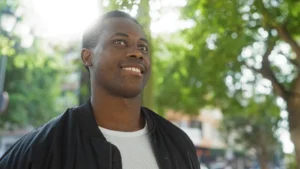 When a child experiences neglect, anxiety, or danger repeatedly in a close relationship, that child often grows up with a sense that they are not okay. Psychology has a name for the longterm, consistent type of trauma that leaves a person feeling insecure, overwhelmed, and unsafe in the world: complex post-traumatic stress disorder, or CPTSD.
When a child experiences neglect, anxiety, or danger repeatedly in a close relationship, that child often grows up with a sense that they are not okay. Psychology has a name for the longterm, consistent type of trauma that leaves a person feeling insecure, overwhelmed, and unsafe in the world: complex post-traumatic stress disorder, or CPTSD.
In our practice as trauma-informed therapists, we recognize that many of those seeking our care have a history of trauma throughout their childhood. It is likely they have complex trauma that has resulted in CPTSD. It’s hard for trauma survivors themselves to recognize this.
Because living in a triggered state of alarm is so familiar, many don’t realize trauma is the source of their feeling “not okay.” That’s why I want to address CPTSD here and to encourage those who feel overwhelmed or hopeless to realize they are not broken. They are injured, and these injuries are treatable.
What is complex trauma or CPTSD?
Complex PTSD or complex trauma is trauma that starts or happens in childhood. It’s relational (occurring in relationships, usually some of the most important ones) and developmental (happening during the formative years of childhood).
Complex trauma is usually recurring (happens more than once) and is inflicted by a caregiver, parent, guardian, or person who has close, repeated contact — like a clergy person, neighbor, or family member. Complex trauma can consist of emotional, physical and/or sexual violence.
Every time I use the term “trauma survivor,” I use it to encompass all types of trauma: complex trauma, single-incident trauma, the list goes on. But in reality, most of my clients are complex trauma survivors — those with CPTSD — and are the people I’m most often talking to and about.
It’s so important to take the mystery out of this disorder and make it concrete by talking more openly about CPTSD. We’ll look at what CPTSD is, what causes it, what it looks like in adulthood, and how we can understand it better and talk about it.
What makes CPTSD so hard to recognize?
Because it happens in the formative years, complex trauma impacts your ability to understand and maintain emotional stability. You may struggle to find a sense of safety and trust throughout your life, and therefore, it is difficult to regulate emotions in relationships.
Complex trauma may lead to a disorganized attachment style, where you struggle to know whether what you think and feel is right or wrong. Standing up for yourself and setting boundaries may feel completely unfamiliar.
It’s often hard to figure out who to trust — if anyone, especially in relationships. In the struggle to make sense of why life feels so bad, those with CPTSD often fault themselves. Many feel intense shame and self-hatred, because they can’t seem to manage emotions “like everybody else.” It’s hard to untangle one’s trauma from one’s identity. That’s the complex piece.
What causes CPTSD?
Complex trauma comes from a history of living with abuse or neglect from those who were supposed to protect and maintain your safety. It changes the way you view life. It can leave an imprint on your nervous system (which is why a bottom-up approach to therapy is so important).
With complex trauma, you were not taken care of appropriately as a child, and that affects you as an adult.
The adverse childhood experiences that can result in CPTSD can be:
- Physical
- Sexual
- Emotional
- Attachment trauma
- Profound neglect
- Or all of the above!
Here are 12 things to know about CPTSD — and how you may recognize it in yourself:
- People with CPTSD may struggle with emotional flashbacks. They may berate themselves for being unable to manage their distress. Much like a trauma survivor who struggles to trust a relationship, they may struggle to trust a sense of self-worth:
- “I’m so stupid”
- “It’s all my fault”
- “I’m no good at anything”
- “I can’t stand to be with myself”
- “I’m a burden”
- “No one cares what I have to say.”
- CPTSD can cause fragmentation, dissociation, and other needed methods of coping. When you’re a child and couldn’t be present for the terrible things that were happening to you, your brain may break off your awareness. It may seem like a part of you is fragmented or holding a memory away from the rest of you to protect you, so that you’re not really present. A lot of people with CPTSD use some level of dissociation. Dissociative mechanisms, like using drugs, alcohol, sex, or food to feel less pain, are coping mechanisms that you developed to help you survive life and feel less, or at least less badly.
- CPTSD causes lack of trust, shame, and voicelessness. Complex trauma survivors — those with CPTSD — often have a distrust of self and others. They may feel like a burden to people, have shame, and be unable to make choices or have a voice for self. This lack of trust becomes ingrained in who you are; you believe everyone is untrustworthy.
- CPTSD survivors may be diagnosed with Borderline Personality Disorder. The behaviors a survivor uses to cope with CPTSD, combined with the inability to emotionally regulate, might lead them to get diagnosed with Borderline Personality Disorder. Someone with “BPD” may have impulsive behaviors and mood swings to cope with CPTSD. BPD is simply another term for “complex trauma survivor.” That’s why we prefer the term “complex trauma survivor” or “CPTSD” rather than “Borderline Personality Disorder,” because this person is using survival mechanisms for protection.
- Complex trauma survivors long to be loved. Yet they struggle to find and keep healthy relationships. They are often at a loss to build trusting relationships, based on their childhood experiences.
- CPTSD is so deeply ingrained in the nervous system and self-view, it’s hard to see. It’s hard to isolate what’s caused by CPTSD and what’s not because it impacts just about every part of emotional and personal development!
- In those with CPTSD, the nervous system remains prepared for danger always – long after the abuse has ended and the child has grown up. This looks like intense hyperarousal or deep hypoarousal as attempts to cope. CPTSD is so devastating, because it disorganizes the nervous system right from the start.
- So many complex trauma survivors like to believe “it wasn’t that bad,” “It was just my normal,” or “it was something I did” (so I have power to change it). This is not true. It was bad. It’s not normal. And you did NOT have the power to change it — you were a child! It’s essential to know that you were powerless over the trauma and to understand that you are a trauma survivor in order to heal.
- CPTSD survivors have no point of reference for what life could look like. There’s no point of reference for who you could be, other than in books or what you might see in others. You have no point of reference for “safe” – not even believing a sense of safety or security can be a real, valid, everyday experience.
- Complex trauma survivors think they’re broken. You may live life thinking you have a “personality disorder,” that you’re just not likable, or that you’re “broken.” And you don’t feel you are ever safe from yourself and the chaos and drama you bring to relationships, which increases shame.
- Attachment trauma is complex trauma. The abuse isn’t always physical or sexual. Injury can come from emotional neglect or attachment trauma resulting from disorganized, insecure or avoidant attachment. (Read about attachment styles here.) Those with attachment trauma are often pushed aside because you can’t “see” their trauma — but it IS trauma all the same. It made a child’s foundation in life shaky, and that is CPTSD!
- Complex trauma survivors are STRONG. As complex trauma survivors grow up, they can often survive anything, because they have figured out how to survive when the worst is happening to them! There is so much strength in this survival!
Complex trauma survivor, please know this…
Please understand that nothing ever felt good, safe, secure, or “in working order” because of what happened to you! It was not your fault. And there is hope for healthy, rewarding relationships in the future.
How do those with CPTSD begin to heal?
Complex trauma survivors can begin to heal by starting to notice what the impact of the trauma is on the self.
It is important to notice that the trauma-related parts of self need nurturing from the self-caring part (the wise adult self) that seeks wholeness and health. In other words, healing starts by looking at what’s old and what’s current. Can you nurture the protective parts of self that developed long ago? You can help them understand they are no longer living in trauma – that today they are safe with the wise adult providing good self-care.
By truly being present today, you can understand that the scared or overwhelming feelings are rooted in old experiences, realizing that you are no longer that child and that the abuse is no longer happening to you. You heal by being present in your current life.
Trauma-informed therapy can be an important first step. Therapy is an emotionally corrective relationship which sets the foundation for safety and trust that you will learn to take elsewhere, into other relationships in your life.
Trauma-informed care is not about what is wrong or bad about you, it’s about what happened to you and how you survived!
Complex trauma survivor: I see you. We specialize in helping survivors like you.
Need support?
A trauma-informed therapist can help. If you’re a potential new client, please contact/email me for care.
Resources
- Loving a Trauma Survivor: Understanding Childhood Trauma’s Impact On Relationships
- All The Little Fragments: Understanding Complex Relational Trauma, by Annie Wright, LMFT
- What is CPTSD?, from Beauty After Bruises
- Trust After Trauma, by Aphrodite Matsakis
- Transforming the Living Legacy of Trauma: A Workbook for Survivors and Therapists, by Janina Fisher, PhD.
- Healing the Fragmented Selves of Trauma Survivors: Overcoming Internal Self-Alienation, by Janina Fisher, PhD.
- Coping with Trauma-Related Dissociation: Skills Training for Patients and Therapists, by Kathy Steele, Onno van der Hart, and Suzette Boon

